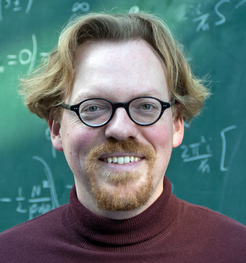1.24 Million Euros for early Universe research
Dr. Jean-Luc Lehners of the Max Planck Institute for Gravitational Physics receives a Consolidator Grant from the European Research Council (ERC)
The head of the Max Planck Research Group “Theoretical Cosmology” won an ERC grant already for the second time: In 2010, Lehners received an ERC Starting Grant to set up his first own research group at the Max Planck Institute for Gravitational Physics. In November 2017, his new research application was approved. Now the contracts have been signed: Over the next five years, Lehners will receive 1.24 million euros for the investigation of quantum effects in the early universe.
According to the current theory, the universe was born from an incredibly dense point: 13.8 billion years ago, all matter that later became stars, planets, clouds of gas and dust, was compressed to a tiny point and then exploded. Since the Big Bang, the universe has been expanding, and with increasing speed.
This classic picture of the origin and evolution of our universe raises many questions that require a theory that unifies Einstein's theory of general relativity with quantum theory. While general relativity describes processes "on large scales" (in space), quantum theory is relevant for the physics of the smallest particles. Only an overarching theory would help us to understand how huge masses behave on tiny scales, as at the Big Bang. However, such a theory of quantum gravity has not yet been found.
A quantum theory of the Big Bang

"We can describe the world we live in with quantum theory," explains Lehners, "but it has not yet been possible to apply it to the big bang or the inside of black holes, because in these cases it has to be combined with Einstein's theory of relativity."
Using modern mathematical methods, Lehners now wants to investigate quantum effects in the early universe to shed light on its dark nursery. "Ultimately, we would like to understand the initial conditions of our universe," says Lehners.
In order to describe the propagation of a particle from point A to B in quantum theory, one has to consider all possible paths that the particle could take, even those not allowed by classical physics. In some sense, all possibilities contribute to reality, although some such possibilities turn out to have a much greater likelihood than others. If one now attempts to apply quantum theory to the universe, it follows that one must take into account all possible evolutions of the universe. And this is precisely what Jean-Luc Lehners and his research team plan on doing, using novel mathematical techniques. The questions that arise in this line of investigation test the very limits of our imagination: could it be that in the early universe more than one possible evolution was relevant, forcing us to picture the universe as a kind of superposition of “universes”? If so, can these different universes influence each other? And does quantum theory allow for “paths” that circumvent the big bang, leading into an even earlier phase of the universe?
Dr. Jean-Luc Lehners (b. 1978 in Luxemburg) studied physics and mathematics at Imperial College in London and at Cambridge University. He did his PhD with a focus on gravitational theory in London in 2005. After postdoc positions in Cambridge and Princeton, the scientist, who is the recipient of numerous awards, obtained an ERC Starting Grant and established his research group in Theoretical Cosmology at the Max Planck Institute for Gravitational Physics in December 2010. Since 2015, the Max Planck Society has been funding his group as a Max Planck Research Group. The ERC Consolidator Grant will fund Lehners’ research until 2023.
Consolidator Grants
The European Research Council funds excellent young scientists whose own independent research group is in the consolidation phase with Consolidator Grants. The ERC supports projects at European research institutions for five years.
In 2017, 2,538 applications for ERC Consolidator Grants were received, of which 329 will be funded; the success rate for this call was 13%.












